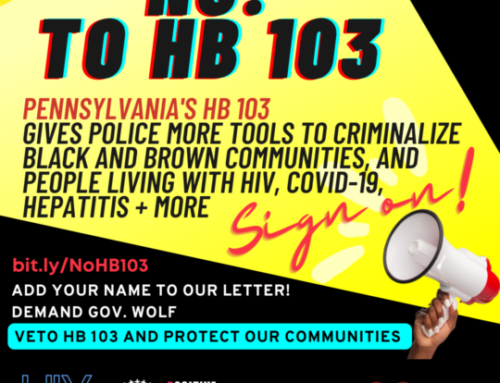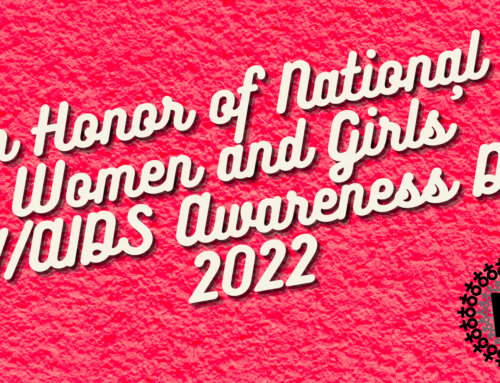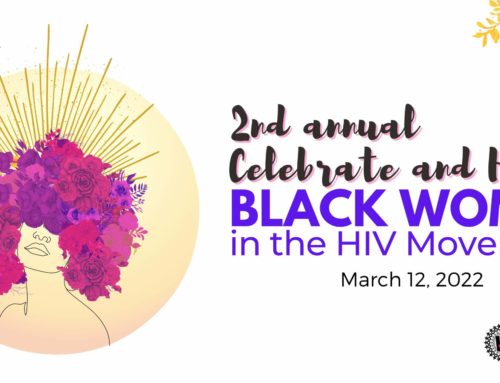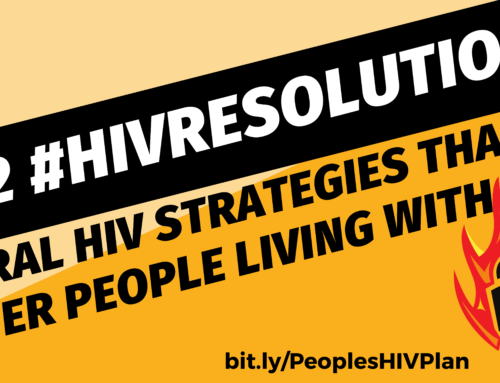FOR IMMEDIATE RELEASE
Contact: Jennie Smith Camejo, jennie.sc.pwnusa@gmail.com / 347.553.5174
October 19, 2015 – Want trauma-informed care to be the next legacy of the Ryan White Program? So do we! Show your organization’s support by signing on now to these recommendations for specific action on the trauma-related objectives in the new National HIV/AIDS Strategy.
Today – during Intimate Partner Violence Awareness Month, and just in time for the National Day of Action to End Violence Against Women Living with HIV – Positive Women’s Network – USA (PWN-USA) joined with the Women’s HIV Program (WHP) at the University of California, San Francisco (UCSF) to submit a letter to the Health Resources and Services Administration HIV/AIDS Bureau (HRSA HAB), administrators of the Ryan White Program, to recommend key implementation steps for the National HIV/AIDS Strategy (“the Strategy”). (Read the full text of PWN-USA and WHP’s letter to HRSA HAB here.)
“There is a crisis of unaddressed trauma among women living with HIV,” says PWN-USA’s Executive Director Naina Khanna. A growing body of research shows that women living with HIV bear an overwhelmingly high burden of intimate-partner violence (IPV) and post-traumatic stress disorder (PTSD), which negatively impacts the quality of their lives as well as their health outcomes across the HIV Care Continuum.
“In a forthcoming study looking at deaths in our program over the past decade, only 16% were due to complications of HIV/AIDS,” adds Edward L. Machtinger, MD, director of UCSF’s WHP. “The majority of the rest of these deaths were due to the effects of trauma: directly though murder; and indirectly through substance abuse, depression, isolation, and illnesses linked to trauma like obesity, diabetes, heart, lung, and liver disease.”
When the newest version of the Strategy was released in July, it contained powerful and long-fought-for commitments to explore trauma-informed approaches to women’s HIV care. A plan for putting the full commitments of the Strategy into action is expected this December. Each federal agency responsible for carrying out goals of the Strategy is currently working on its own plan of action.
To help make sure HRSA HAB’s action plan includes critical steps to making trauma-informed care and services a reality, for women and all the more than 500,000 people living with HIV in the US engaged in Ryan White-funded services, PWN-USA and WHP’s letter to HRSA HAB outlines specific requests for action on this crucial health concern:
- Provide training for case managers, social workers, nurses, administrators, doctors, and other clinic professionals at Ryan White service delivery sites to use trauma-informed approaches with clients and among staff
- Require Ryan White programs to collect and report data about rates of IPV and PTSD symptoms – as well as more accurate data about rates of substance use, depression, stigma, and social isolation
- Facilitate implementation and evaluation projects of trauma-informed primary care in at least 6 primary care clinics serving women, including transgender women, living with HIV
- Integrate evidence-based responses to PTSD into existing funded clinical services, including therapy, psychiatry, medication adherence, and substance abuse treatment
- Encourage collaborations between community-based IPV organizations and trauma recovery centers, and HIV and primary care clinics and AIDS service organizations
- Look for demonstrated commitment to the above factors when assessing grantee applications
Show your organization’s support for these recommendations by signing on to this form!
“There are many evidence-based interventions to heal from trauma, and it is important to know that treatments for substance abuse and depression are far more effective if trauma is concurrently treated,” comments Dr. Machtinger. “Ryan White clinics need to be educated, supported, and resourced to integrate these interventions into care, and then held accountable for preventable trauma-related deaths.”
Earlier this year, PWN-USA and WHP teamed with provider-researchers from UCSF to publish a peer-reviewed article to help providers incorporate trauma-informed care into clinical practice. PWN-USA and WHP are far from alone in calling for trauma-informed approaches, nor would HRSA HAB be alone on the federal stage in implementing them. Last year, the US Substance Abuse and Mental Health Services Administration (SAMHSA) released a guide for implementing trauma-informed care; trauma-informed methods are also being used by providers at the US Department of Veterans Affairs with clients who are homeless and who have survived wars. And just last month, the Federal Partners Committee on Women and Trauma convened the Building a Trauma-Informed Nation Summit, which brought together community leaders (including Naina Khanna of PWN-USA) from across sectors to discuss strategies for securing trauma-informed practice within as well as outside the realm of health services.
“HRSA HAB is in a unique and optimal position to serve as a beacon in this movement to expand trauma awareness and healing, and to profoundly improve the lives of individuals and communities impacted by HIV,” says Khanna. HRSA HAB can make this possible by creating a bold action plan to implement trauma-informed practice, with measurable goals and outcomes. “The success of this National HIV/AIDS Strategy is predicated on successful adherence to treatment and engagement in care. For many people living with HIV, that will not be possible without addressing the trauma in their lives. So many of the deaths today are preventable, and any preventable trauma-related death in a Ryan White program will increasingly come to be seen as the result of inaction.”
In the words of the first Strategy’s Implementation Plan, from 2010: “The National HIV/AIDS Strategy is just a collection of words on paper, unless it provides a strategic vision for the country that leads to action.” In observing this year’s Day of Action to End Violence Against Women with HIV this week, we urge community members to share this statement, spread the word, and keep your eyes on PWN-USA’s website. Organizations can also show their agreement with PWN-USA’s recommendations to HRSA by signing onto the form below.
HRSA is at the helm of a life-expanding source of high-quality care for communities living with HIV that was itself a pioneer in the field of comprehensive, community responsive health services. We look forward to collaborating with HRSA to help make trauma-informed care the Ryan White HIV/AIDS Program’s next great innovation.
To sign your organization on to this statement, click this link or use the form below.
[googleapps domain=”docs” dir=”forms/d/1YqUiIB8U4KdDbexiRjXbPjWtk-G5JTy1ByV08ID76hg/viewform” query=”embedded=true” width=”760″ height=”500″ /]






[…] also to put forward solutions. One of the major initiatives PWN-USA is working toward is a trauma-informed model of care for WLHIV. We are also working to repeal laws that place WLHIV at disproportionate risk of […]
[…] and the Women’s HIV Program (WHP) at the University of California, San Francisco (UCSF) submitted a letter to the Health Resources and Services Administration HIV/AIDS Bureau (HRSA HAB), administrators of the federal Ryan White Program, recommending key National HIV/AIDS Strategy […]